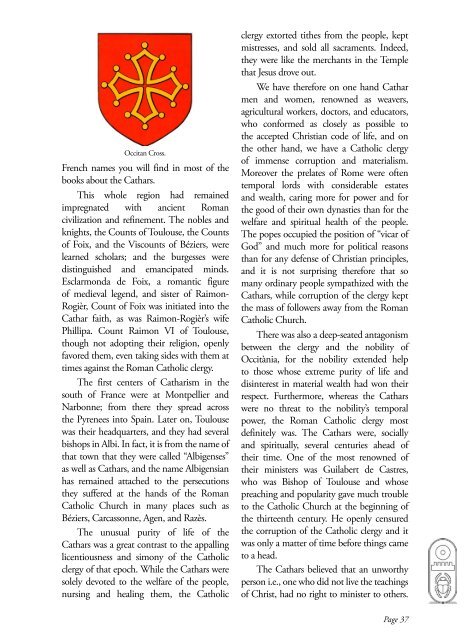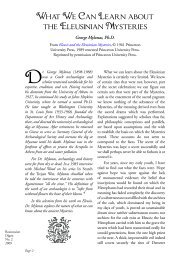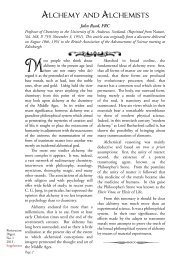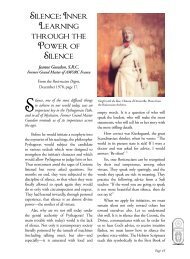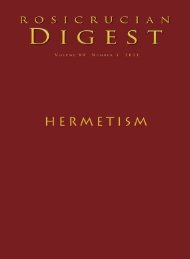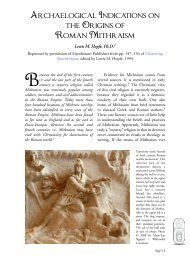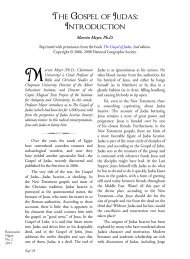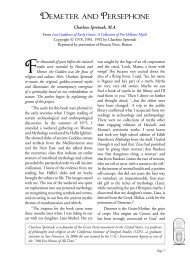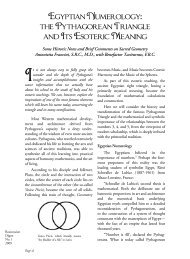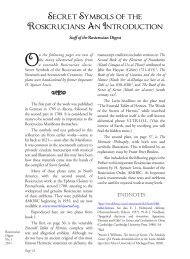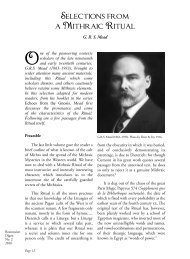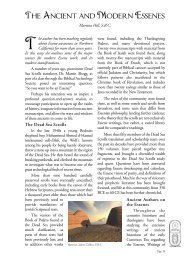Rosicrucian Digest Vol 89 No 2 2011 Gnosticism - Rosicrucian Order
Rosicrucian Digest Vol 89 No 2 2011 Gnosticism - Rosicrucian Order
Rosicrucian Digest Vol 89 No 2 2011 Gnosticism - Rosicrucian Order
Create successful ePaper yourself
Turn your PDF publications into a flip-book with our unique Google optimized e-Paper software.
Occitan Cross.<br />
French names you will find in most of the<br />
books about the Cathars.<br />
This whole region had remained<br />
impregnated with ancient Roman<br />
civilization and refinement. The nobles and<br />
knights, the Counts of Toulouse, the Counts<br />
of Foix, and the Viscounts of Béziers, were<br />
learned scholars; and the burgesses were<br />
distinguished and emancipated minds.<br />
Esclarmonda de Foix, a romantic figure<br />
of medieval legend, and sister of Raimon-<br />
Rogièr, Count of Foix was initiated into the<br />
Cathar faith, as was Raimon-Rogièr’s wife<br />
Phillipa. Count Raimon VI of Toulouse,<br />
though not adopting their religion, openly<br />
favored them, even taking sides with them at<br />
times against the Roman Catholic clergy.<br />
The first centers of Catharism in the<br />
south of France were at Montpellier and<br />
Narbonne; from there they spread across<br />
the Pyrenees into Spain. Later on, Toulouse<br />
was their headquarters, and they had several<br />
bishops in Albi. In fact, it is from the name of<br />
that town that they were called “Albigenses”<br />
as well as Cathars, and the name Albigensian<br />
has remained attached to the persecutions<br />
they suffered at the hands of the Roman<br />
Catholic Church in many places such as<br />
Béziers, Carcassonne, Agen, and Razès.<br />
The unusual purity of life of the<br />
Cathars was a great contrast to the appalling<br />
licentiousness and simony of the Catholic<br />
clergy of that epoch. While the Cathars were<br />
solely devoted to the welfare of the people,<br />
nursing and healing them, the Catholic<br />
clergy extorted tithes from the people, kept<br />
mistresses, and sold all sacraments. Indeed,<br />
they were like the merchants in the Temple<br />
that Jesus drove out.<br />
We have therefore on one hand Cathar<br />
men and women, renowned as weavers,<br />
agricultural workers, doctors, and educators,<br />
who conformed as closely as possible to<br />
the accepted Christian code of life, and on<br />
the other hand, we have a Catholic clergy<br />
of immense corruption and materialism.<br />
Moreover the prelates of Rome were often<br />
temporal lords with considerable estates<br />
and wealth, caring more for power and for<br />
the good of their own dynasties than for the<br />
welfare and spiritual health of the people.<br />
The popes occupied the position of “vicar of<br />
God” and much more for political reasons<br />
than for any defense of Christian principles,<br />
and it is not surprising therefore that so<br />
many ordinary people sympathized with the<br />
Cathars, while corruption of the clergy kept<br />
the mass of followers away from the Roman<br />
Catholic Church.<br />
There was also a deep-seated antagonism<br />
between the clergy and the nobility of<br />
Occitània, for the nobility extended help<br />
to those whose extreme purity of life and<br />
disinterest in material wealth had won their<br />
respect. Furthermore, whereas the Cathars<br />
were no threat to the nobility’s temporal<br />
power, the Roman Catholic clergy most<br />
definitely was. The Cathars were, socially<br />
and spiritually, several centuries ahead of<br />
their time. One of the most renowned of<br />
their ministers was Guilabert de Castres,<br />
who was Bishop of Toulouse and whose<br />
preaching and popularity gave much trouble<br />
to the Catholic Church at the beginning of<br />
the thirteenth century. He openly censured<br />
the corruption of the Catholic clergy and it<br />
was only a matter of time before things came<br />
to a head.<br />
The Cathars believed that an unworthy<br />
person i.e., one who did not live the teachings<br />
of Christ, had no right to minister to others.<br />
Page 37


